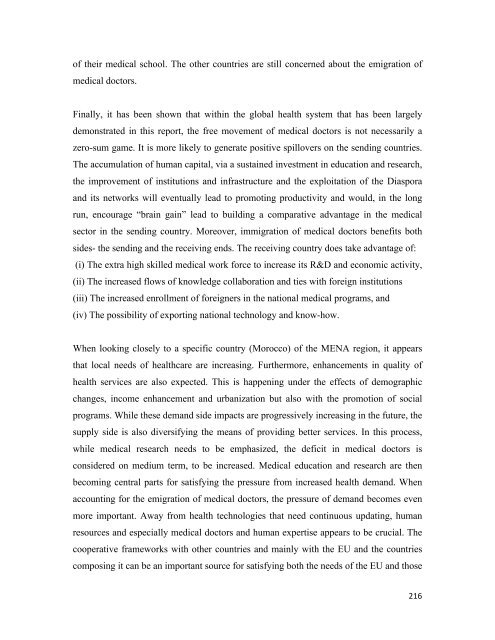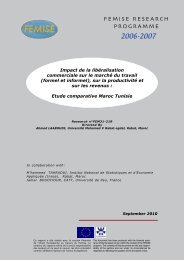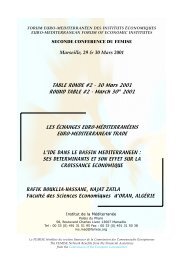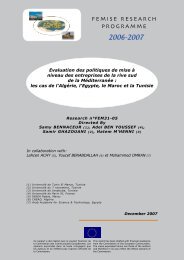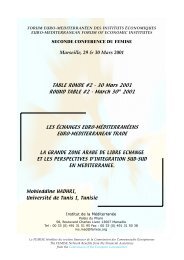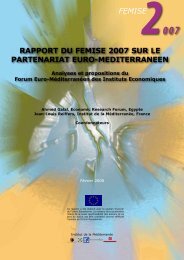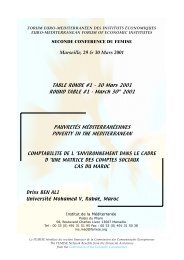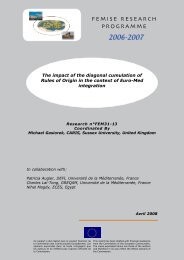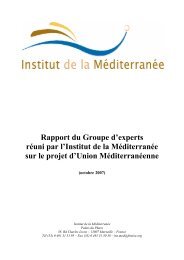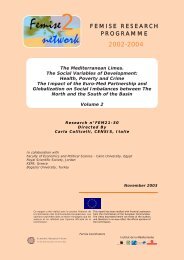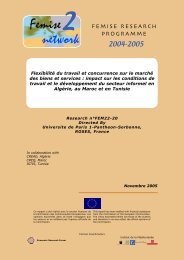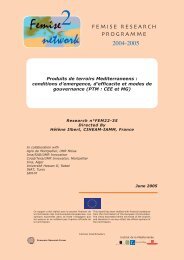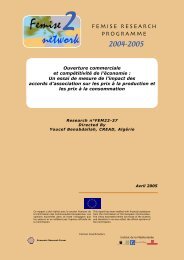Download the report - Femise
Download the report - Femise
Download the report - Femise
Create successful ePaper yourself
Turn your PDF publications into a flip-book with our unique Google optimized e-Paper software.
of <strong>the</strong>ir medical school. The o<strong>the</strong>r countries are still concerned about <strong>the</strong> emigration of<br />
medical doctors.<br />
Finally, it has been shown that within <strong>the</strong> global health system that has been largely<br />
demonstrated in this <strong>report</strong>, <strong>the</strong> free movement of medical doctors is not necessarily a<br />
zero-sum game. It is more likely to generate positive spillovers on <strong>the</strong> sending countries.<br />
The accumulation of human capital, via a sustained investment in education and research,<br />
<strong>the</strong> improvement of institutions and infrastructure and <strong>the</strong> exploitation of <strong>the</strong> Diaspora<br />
and its networks will eventually lead to promoting productivity and would, in <strong>the</strong> long<br />
run, encourage “brain gain” lead to building a comparative advantage in <strong>the</strong> medical<br />
sector in <strong>the</strong> sending country. Moreover, immigration of medical doctors benefits both<br />
sides- <strong>the</strong> sending and <strong>the</strong> receiving ends. The receiving country does take advantage of:<br />
(i) The extra high skilled medical work force to increase its R&D and economic activity,<br />
(ii) The increased flows of knowledge collaboration and ties with foreign institutions<br />
(iii) The increased enrollment of foreigners in <strong>the</strong> national medical programs, and<br />
(iv) The possibility of exporting national technology and know-how.<br />
When looking closely to a specific country (Morocco) of <strong>the</strong> MENA region, it appears<br />
that local needs of healthcare are increasing. Fur<strong>the</strong>rmore, enhancements in quality of<br />
health services are also expected. This is happening under <strong>the</strong> effects of demographic<br />
changes, income enhancement and urbanization but also with <strong>the</strong> promotion of social<br />
programs. While <strong>the</strong>se demand side impacts are progressively increasing in <strong>the</strong> future, <strong>the</strong><br />
supply side is also diversifying <strong>the</strong> means of providing better services. In this process,<br />
while medical research needs to be emphasized, <strong>the</strong> deficit in medical doctors is<br />
considered on medium term, to be increased. Medical education and research are <strong>the</strong>n<br />
becoming central parts for satisfying <strong>the</strong> pressure from increased health demand. When<br />
accounting for <strong>the</strong> emigration of medical doctors, <strong>the</strong> pressure of demand becomes even<br />
more important. Away from health technologies that need continuous updating, human<br />
resources and especially medical doctors and human expertise appears to be crucial. The<br />
cooperative frameworks with o<strong>the</strong>r countries and mainly with <strong>the</strong> EU and <strong>the</strong> countries<br />
composing it can be an important source for satisfying both <strong>the</strong> needs of <strong>the</strong> EU and those<br />
! "*&!


